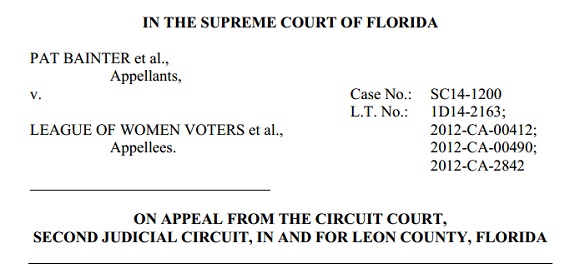By Ashley Lopez
Florida Center for Investigative Reporting
The head of a GOP consulting group forced by court order to release documents showing his company may have been illegally used to redraw political districts, including evidence the company tried to hide its involvement by using third parties, is defending his and the company’s actions.
Besides the release of 538 previously-leaked documents containing emails, memos and maps belonging to Data Targeting in Gainesville, the Florida Supreme Court also ordered the release of a deposition featuring the head of the company, Pat Bainter.
Plaintiffs in the case, led by Florida’s League of Women Voters, claim GOP consulting group Data Targeting was a key player in the state’s effort to redraw political districts. The plaintiffs filed a lawsuit accusing state lawmakers of breaking laws under the 2010 Fair Districts Amendments, which prohibit legislators from drawing political districts that favor one party over another.
A Tallahassee judge eventually sided with the plaintiffs, but directed referred the issue of whether Data Targeting’s documents should be made public to the Florida Supreme Court. Justices unanimously ruled last week that all the documents should be made public.
Together, all the documents show the political consulting group made a concerted effort to work around Florida’s gerrymandering ban by submitting maps through third parties.
Following the release of the emails and Bainter’s deposition, Bainter gave an interview this week to The Naples Daily News about the documents.
Here is an excerpt:
“Did you have maps in your possession that you got third parties to file that you had prepared or that your friends had prepared,” said David King, who represents the group challenging the congressional maps.
It was among a series of questions while Bainter was on the stand during a May hearing. Lewis, the Tallahassee judge, closed the courtroom while Bainter testified, a move fought by media organizations, including Scripps Newspapers. His testimony was released as part of the Florida Supreme Court’s ruling.
Bainter, in an interview, said the case hits on loftier legal questions about whether anti-gerrymandering constitutional amendments made political consultants “second class citizens” who can’t participate in the process to the same degree as other citizens.
“At the end of the day, I pay attention to politics. Of course I know more than most people,” Bainter told Scripps-Tribune. “Does that take away my right to free speech, to petition my government?”
He defends the strategy of using third-parties to submit proposed maps as part of the Legislature’s formal redistricting process.
“I’m damned if I do, damned if I don’t,” he said. “If I submit maps in my name…than that is made into a spectacle. The individual lawmakers themselves would be put in some conflict.”
Among the documents that were originally sealed under court order were 538 emails the firm fought to protect. They highlight chatter between a handful of political consultants working to shape districts at all levels. At one point, they took pains to be discrete about strategies for recruiting people to submit maps.
The emails released last week show that besides recruiting other people to submit the maps made by Data Targeting so they wouldn’t get traced back to them, the company was also careful to not put too much on the record. In fact, a lot of recruitment was done over the phone.
In his interview with The Naples Daily News, Bainter argued “the system consisted of people with similar political viewpoints organizing to petition their government, which is constitutional.”
“How often do school teachers write a senator or state legislator at the behest of the teachers union?” Bainter told the Naples Daily News. “I support their right to do that. You can’t be inconsistent.”
Plaintiffs are arguing the newly drawn maps are also invalid because they were drawn with political favoritism.
Supporters of the state’s maps say the plaintiffs in the case are fighting the maps for purely political reasons.

